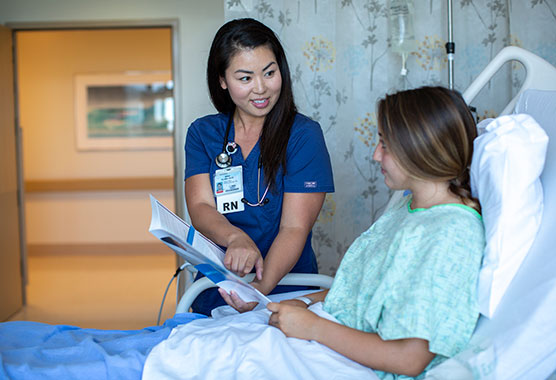Polycystic Ovary Syndrome (PCOS)
PCOS is linked to infertility, diabetes, menstrual problems and other issues. Our women’s health specialists provide complete care for all PCOS symptoms.
Medically reviewed by Clara Paik, M.D. on Sep. 14, 2023.

Care, Diagnosis and Treatments for PCOS
PCOS symptom management often requires a team approach. You may receive care from UC Davis Health OB-GYNs and endocrinologists. We also have a pediatric PCOS Clinic for teens.
What Is PCOS?
Polycystic ovary syndrome (PCOS) is a type of hormonal and endocrine disorder. High levels of androgen, a sex hormone, cause:
- Infertility
- Irregular menstrual periods
- Multiple ovarian cysts (polycystic)
- Skin and hair changes
- Weight gain
PCOS also increases your risk for diabetes, high blood pressure, heart problems and other conditions.
PCOS Symptoms
PCOS symptoms typically appear during the teen years. But the condition affects everyone differently. Some women don’t know they have PCOS until they try to get pregnant.
Common Symptoms
Signs of PCOS include:
- Excess hair on your face, chest or thighs (hirsutism)
- Infertility
- Irregular periods
- Obesity
- Oily skin and severe acne
- Velvety, thick, darkened skin (acanthosis nigricans)
PCOS Causes and Risk Factors
People with PCOS make too much androgen hormones. An overproduction of androgen can stop ovulation, leading to irregular periods and infertility, among other problems.
Experts aren’t sure why this happens. However, certain factors may make you more prone to PCOS, including:
Biological Sex and Age
PCOS is a lifelong condition. Symptoms are most severe when a woman is between the ages of 15 and 44. These are typically a woman’s reproductive years.
Diabetes
Your risk for PCOS increases if you, your mother or sister have type 2 diabetes or prediabetes (insulin resistance).
Family History
You are more likely to have PCOS if your mother, sister or another close relative has the condition.
Weight
Having excess weight or obesity may increase your risk. However, people with average weight also get PCOS.
Diagnosing PCOS
Your provider may make an initial PCOS diagnosis based on your symptoms and family history.
Certain tests can help confirm the diagnosis, including:
- Physical exam, including a pelvic exam to look for a cause for irregular periods
- Blood and urine tests to measure hormone and blood sugar (glucose) levels
- Abdominal-pelvic ultrasound to look for ovarian cysts and check the thickness of your uterine lining
PCOS Treatments
PCOS treatments depend on your age, symptoms and pregnancy plans. We offer a full range of PCOS treatments:
Fertility Treatments
High androgen levels affect ovulation, making PCOS a top cause of infertility. Our reproductive health and infertility experts can help you conceive.
Medications
If you aren’t trying to conceive, hormonal birth control, such as the pill, can lower androgen levels and make your periods more regular. You may also need medications for diabetes, excess hair growth and acne.
Weight Loss
Maintaining a healthy weight through good nutrition and exercise can have a positive effect on insulin and blood pressure. Losing excess weight may also improve your chances of getting pregnant.
Preventing PCOS Complications
While you can’t prevent PCOS, certain lifestyle changes can lower your risk of complications.
Eat Healthy
Your provider may recommend following a low-carbohydrate, low-sugar diet. Nutritious meals with lots of fresh fruits and vegetables can keep your blood sugar levels in a healthy range. Our nutrition experts can help.
Manage Your Weight
Excess weight when you have PCOS can increase your risk for diabetes, high blood pressure and heart problems. Our weight management classes can help you achieve a healthy weight.
Who does it affect?
5MWomen have PCOS
Undiagnosed cases
3 in 4Women with PCOS don’t know they have it
Sources: Centers for Disease Control and Prevention (CDC): PCOS (Polycystic Ovary Syndrome) and Diabetes
World Health Organization: Polycystic Ovary Syndrome
Request an Appointment
As Sacramento's No. 1 hospital, you'll benefit from unique advantages in primary care and specialty care. This includes prevention, diagnosis and treatment options from experts in 150 specialties.
Referring Physicians
To refer a patient, submit an electronic referral form or call.
800-4-UCDAVIS
Patients
Call to make an appointment.
Consumer Resource Center
800-2-UCDAVIS

Ranked among the nation’s best hospitals
A U.S. News & World Report best hospital in cardiology, heart & vascular surgery, diabetes & endocrinology, ENT, geriatrics, neurology & neurosurgery, and pulmonology & lung surgery.

Ranked among the nation’s best children’s hospitals
U.S. News & World Report ranked UC Davis Children’s Hospital among the best in pediatric nephrology, orthopedics*, and pulmonology & lung surgery. (*Together with Shriners Children’s Northern California)

Ranked Sacramento’s #1 hospital
Ranked Sacramento’s #1 hospital by U.S. News, and high-performing in aortic valve surgery, back surgery (spinal fusion), COPD, colon cancer surgery, diabetes, gynecological cancer surgery, heart arrhythmia, heart failure, kidney failure, leukemia, lymphoma & myeloma, lung cancer surgery, pacemaker implantation, pneumonia, prostate cancer surgery, stroke, TAVR, cancer, orthopedics, gastroenterology & GI surgery, and urology.

The nation’s highest nursing honor
UC Davis Medical Center has received Magnet® recognition, the nation’s highest honor for nursing excellence.

World-class cancer care
One of ~59 U.S. cancer centers designated “comprehensive” by the National Cancer Institute.

A leader in health care equality
For the 13th consecutive year, UC Davis Medical Center has been recognized as an LGBTQ+ Healthcare Equality Leader by the educational arm of America’s largest civil rights organization.

